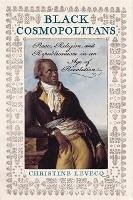Black Cosmopolitans examines the lives and thought of three extraordinary black men-Jacobus Capitein, Jean-Baptiste Belley, and John Marrant-who traveled extensively throughout the eighteenth-century Atlantic world. Unlike millions of uprooted Africans and their descendants at the time, these men did not live lives of toil and sweat in the plantations of the New World. Marrant was born free, while Capitein and Belley became free when young, and this freedom gave them not only mobility but also the chance to make significant contributions to print culture. As public intellectuals, Capitein, Belley, and Marrant developed a cosmopolitan vision of the world anchored in the republican ideals of civic virtue and communal life, and so helped radicalize the calls for freedom that were emerging from the Enlightenment.
Relying on sources in English, French, and Dutch, Christine Levecq shows that Calvinism, the French Revolution, and freemasonry were major inspirations for this republicanism. By exploring these cosmopolitan men's connections to their black communities, she argues that the eighteenth-century Atlantic world fostered an elite of black thinkers who took advantage of surrounding ideologies to spread a message of universal inclusion and egalitarianism.
Dieser Download kann aus rechtlichen Gründen nur mit Rechnungsadresse in A, D ausgeliefert werden.









